A cancer diagnosis separated Bienen sophomore Dominic Davis from his life’s passion. Now, after losing half of his jaw, the French horn performance major is making a comeback.
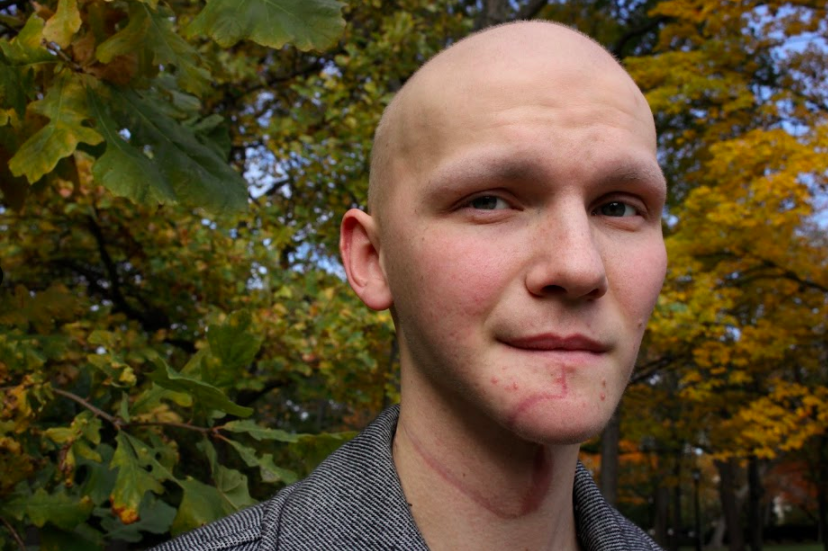
On a rainy fall afternoon at the University of Chicago’s Comer Children’s Hospital, Dominic Davis sits atop an examination table. Usually at this time Northwestern students are walking to class or first rolling out of bed, but Davis, a Bienen sophomore, woke up long before to trek all the way to the South Side for his appointment.
He sits next to his mother, waiting on the table until a nurse comes in. Davis takes his shirt off, exposing scars on his left arm and his chest, and puts on a face mask to cover his mouth. The nurse sits beside him on his right with a needle, and Davis winces as she sticks the needle into the scar on his chest, the outline of a rectangle against his pale skin. The treatment is ifosfamide, a chemotherapy for cancer.
* * *
Most people do not find their passion until they reach adulthood, but a lucky few have the chance of finding it early. Davis found his the summer before sixth grade. His mother, Lisa, a former professional opera singer, encouraged him to begin studying an instrument. Davis always liked classical music as a child and preferred it to the pop he heard on the radio. After trying out the trumpet, he played the French horn for the first time and fell in love. This love affair would continue throughout Davis’ life.
In high school, Davis’ focus on horn playing intensified when he began studying with his first horn teacher, Lee Shirer.
“He was really great and motivated me so much, and I was really anxious to succeed when I was practicing,” Davis says. “I remember one summer, I think I practiced three or four hours a day.”
With sheer motivation and the need to succeed, the Indiana native auditioned for the prestigious Chicago Youth Symphony Orchestra as a high school junior and made the cut. As his senior year rolled around, Davis began to think about auditioning for colleges to pursue his passion. Although he auditioned for some of the best conservatories in the country, including Julliard, Davis always had a soft spot in his heart for Northwestern: both of his parents had attended graduate school at NU, and he felt he would be successful there. After being waitlisted at Julliard, Davis decided to begin his future at the Bienen School of Music.
As a freshman, Davis prospered musically and believed that his relationship with the horn deepened. He played difficult repertoire at his recital, including “Alpha,” a contemporary piece for horn and piano by the French composer Jean-Michel Defaye.
“The horn was an extension of myself,” Davis says. “I could just sing a melody and play it on the horn and it felt like another part of my voice.”
Later in the school year, Davis was selected to participate in the New York String Orchestra Seminar, a reputable weeklong program at New York City’s Mannes School of Music, which accepts only two or three French horn players from throughout the country. He was actively developing as a musician, playing increasingly difficult solo and orchestral repertoire – until he had to stop.
At the beginning of Spring Quarter of his freshman year, Davis noticed some pain in his teeth and jaw, as well as numbness in his lip. He assumed it was a tooth infection. Davis went to the dentist as a precaution, but the dentist couldn’t figure out the source of his pain.
“I was going through every single weird dental problem it could be,” Davis says.
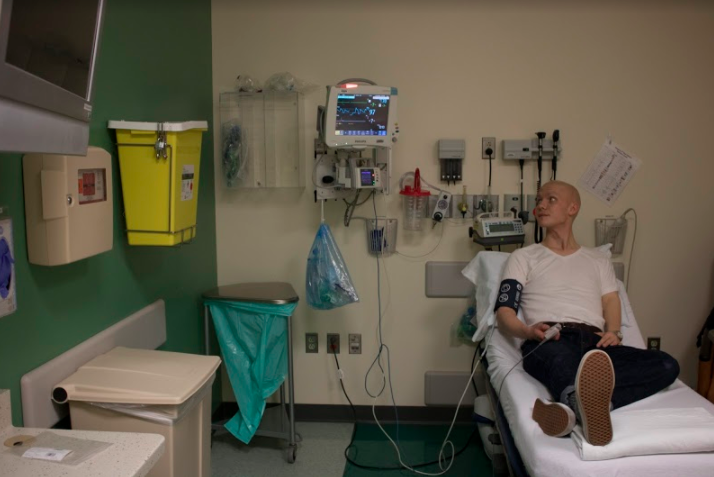
The dentist saw a red flag from Davis’ past: As a six-year-old, he fell on the playground and broke his arm. His hospital X-rays at the time showed that the break in his arm formed an abnormal triangle shape. Davis’ parents made an appointment at Comer and discovered that he had osteosarcoma, also known as bone cancer, in his upper arm; he entered remission after seven months of chemotherapy.
Davis’ dentist suggested to see an oral surgeon and to consider his history of cancer. Without hesitation, Davis’ family traveled to Comer Children’s Hospital for a biopsy, and from that test, he received another diagnosis: jaw bone cancer, known scientifically as osteosarcoma of the mandible.
“That was just shocking,” Davis says. He remembers thinking, “Oh my God, what am I going to do?”
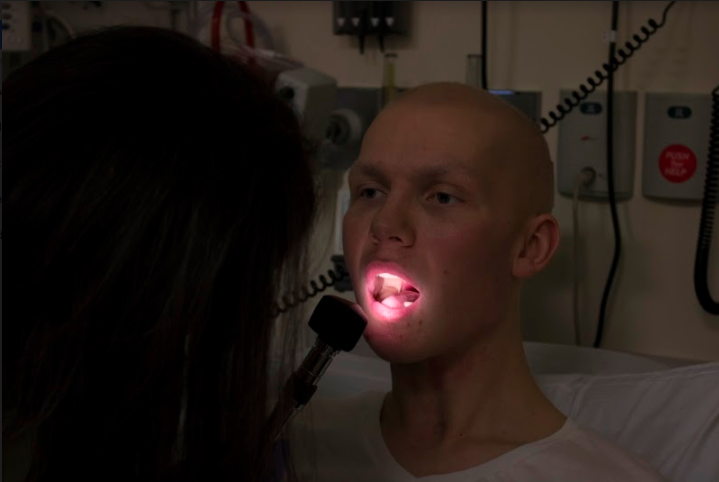
Family and friends were shocked at the unbearable news. Davis’ lifelong friend, Alexandra Jacobs, was there for him through his first battle with cancer and never thought she would have to see him go through a second battle.
“I remember receiving the information on a bus on the way to class,” the Indiana University sophomore says. “I immediately started crying. I felt horrible and afraid for him. . .to take away a French horn major’s jaw is the biggest ‘fuck you’ from the universe I could imagine.”
While his friends and family were terrified, Davis remained hopeful. Having gone through a straightforward treatment as a child, he felt that his typically good health and past optimism would help to combat the tumor. Davis initially thought he would be back to playing horn soon after the tumor’s removal – but the necessary surgery proved far more invasive than he had assumed. Davis’ doctor, Zhen Gooi, was very honest with how the surgery would affect his life.
“Dr. Gooi. . .was very judicious in saying, ‘You know, we are going to have to cut through a lot of muscle that is very central to your playing,’” Davis says, “‘and so we don’t know if you’re going to be able to play after we’re done.’”
Since the tumor was so large, Davis had to take time off from lessons, orchestra and studio classes until after the surgery. The earliest he could attempt to return to the instrument was in the fall of his sophomore year.
“When I first told one of my professors, he was just like, ‘I don’t even know what to say, I’m so sorry,’” Davis says. “It was kind of like he was looking at a dead person.”
Davis’ other French horn professor, Gail Williams was heartbroken when she heard about Davis’ diagnosis, “How would anyone feel when a very talented young musician has been struck again with this horrible disease?” Williams says. “Devastated!”
Davis returned to Comer for surgery on May 31. Doctors removed half of his jaw and reconstructed it with the middle section of his left calf bone, along with muscle, fat and skin. After sewing this section into his mouth, doctors moved some lymph nodes in order to attach the bone to a neck artery for blood supply.
When Davis woke up, he felt traumatized. “I had a breathing tube,” Davis says. “You can’t talk at all for days. . .Not being able to talk when you need so much help is really hard.”
Davis ended the school year believing that his cancer was completely gone. In July, though, he noticed another bump on his lip. Concerned, Davis went back to UChicago for another biopsy, which confirmed that the cancer was back – and worse. He had a large tumor in his lip, a tumor under the chin and two in the masticator space, which is a deep facial cavity between the skull cap and jawbone. The cancer had also spread to the lungs. Since any operation in the masticator space would severely impair his speech and facial movement, Davis had few recovery options.
!["I wouldn't be able to move my mouth after [additional surgery]...When you're in a situation like that, you have to see if there are any other options that give you a better quality of life."](http://media.northbynorthwestern.com.s3.amazonaws.com/uploads/2018/02/01/Davis_1.png)
“I wouldn’t be able to move my mouth after [additional surgery],” he said. When you’re in a situation like that, you have to see if there are any other options that give you a better quality of life.”
The cancer had also spread to Davis’ lungs and the corner of his mouth. After deciding against surgery, Davis went through chemotherapy. Although he received treatment, his dreams of quickly returning to the horn were crushed. At one point, Davis was able to play almost four octaves, the complete range on the French horn, but after his surgery and the cancer’s recurrence, he was only capable of playing two and a half. His embouchure, the way Davis uses his mouth to play, was also weaker after surgery.
Although surgery and treatment has greatly affected Davis’ technical ability on the horn, he has been practicing hard and working with his professors toward achieving the sound he once had. Williams says she works with Davis “to improve his embouchure strength and the ability to extend [his] range so that he can play more repertoire. Finding the correct repertoire is something we look for in each lesson.”
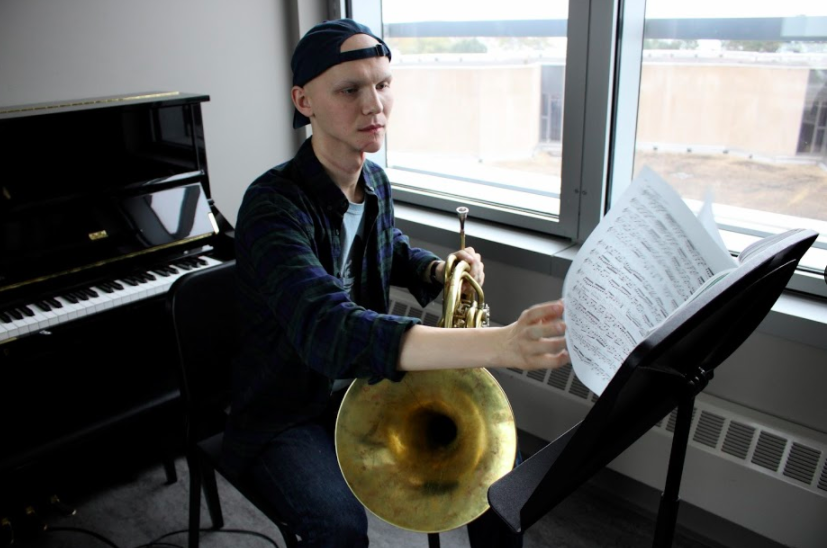
Jacobs, who video chats Davis a few times a week, says her friend is extremely resilient and is working hard to regain his playing ability.
“Dominic’s biggest strength is his positivity,” Jacobs says. “Seriously, this kid is impossibly positive. He has endured so much and has truly been through hell and back.”
Having upped his practice stamina from five minutes per day to hours, Davis is persisting as a French horn player. He finally feels like he can be a “productive member of the orchestra.”
“In the beginning, it was tough because I had to really work hard just to do the bare minimum of what was acceptable, but I work more and more and I feel like I can actually contribute,” Davis says. “It’s not as if I’m not allowed to stop loving music afterwards.”
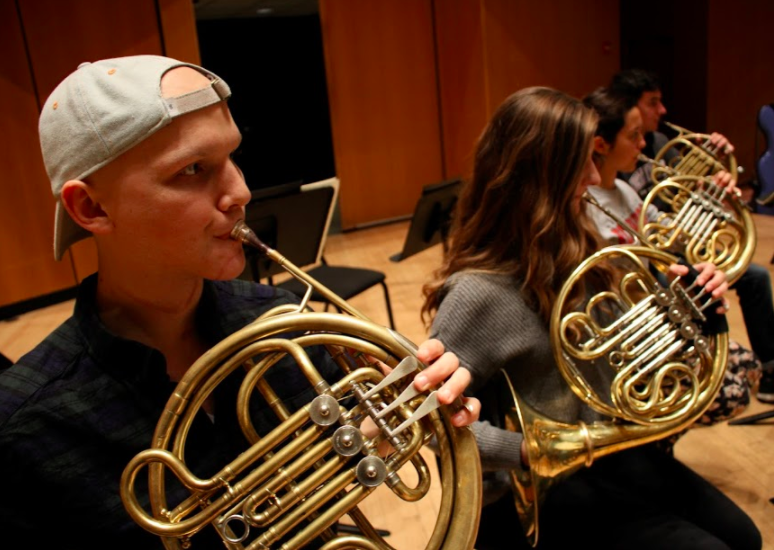
Today, Davis is still going through targeted therapy treatments and chemotherapy, while also practicing diligently. His embouchure continues to grow stronger every day. Davis is still fourth chair in Chamber Orchestra, but he is now able to play three and a half octaves. He hopes to audition for a classical summer music festival.
“Really my goal right now is just to pursue everything I wanted before,” Davis says. “Still become a horn player, graduate college, live my life as long as I can and whatever happens, happens.”